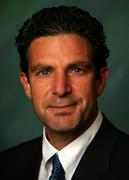 Dr. Stacey Berner, president of SurgCenter Development, looks into the future of freestanding ambulatory surgery centers and offers his thoughts on the best strategies for success.
Dr. Stacey Berner, president of SurgCenter Development, looks into the future of freestanding ambulatory surgery centers and offers his thoughts on the best strategies for success. Providers across the entire continuum of healthcare are feeling pressure: pressure of decreasing reimbursement, struggle to meet new rules and regulations and pressure to make the switch to value-based care. Many providers have reacted to the challenges of the current healthcare environment by merging or creating new partnerships. The escalating consolidation trend has left many leaders of independent ambulatory surgery centers unsure of the future.
Stacey Berner, MD, president and principal of SurgCenter Development, predicts a sustainable future for independent ASCs. Here, he offers his thoughts on the challenges facing ASC independence and the best strategies for creating a sustainable future.
Question: Do you think independence remains a viable option for surgery centers?
Dr. Stacey Berner: Absolutely. As partners, our physicians and surgeons are empowered. This creates an environment which drives excellent, collaborative, clinical and business decision-making.
Q: What are a few of the greatest challenges freestanding ASCs face?
SB: In certain markets, competition for a fixed pool of healthcare dollars can be fierce, and hostility can be encountered from outside entities. Furthermore, the entire healthcare delivery system will be faced with downward pressure. ASCs with clear strategies to manage the external and internal stressors will enjoy the greatest success.
Q: How ASC leaders address these challenges?
SB: As a physician- and surgeon-owned and run company, we understand our physicians very well. The challenges are best addressed at the outset. Creating an all-star team of committed physicians within the key specialties can be critical to success.
Q: When does it make sense for leaders of freestanding ASCs to consider taking on a hospital partner or transitioning to a HOPD?
SB: We have not yet identified a circumstance where this would be a necessary or practical decision for our centers. However, struggling ASCs may seek support from joining forces with hospitals. The individual owners should carefully scrutinize constraints that may be placed upon them as they enter into new agreements.
It is important to be certain that the surgery center partners and hospital system have alignment of incentives. If this is not the case, the physicians and surgeons are in danger of entering a "worst case scenario": forfeiture of the capacity to remain autonomous and flexible in a changing market, coupled with perpetuation of poor financial performance.
Q: Are there any opportunities for independent centers to succeed in the changing healthcare market?
SB: There remain excellent opportunities to maintain independence, provided that a truly patient- and-physician centric environment exists. Choosing the right partners, within the specialties that have remained most independent, and have historically performed well is important.
Clear and frank communication with the physicians and surgeons on a regular basis creates an environment that is positive and collaborative. This approach should remain successful for the foreseeable future, and there is nothing within the economic or political landscape to suggest otherwise.
More Articles on Transactions and Valuation Issues:
Hospital Partnerships: 4 Considerations for ASCs Before Taking the Plunge
10 Recent Ambulatory Surgery Center Plans, Openings & Expansions
6 Statistics on Surgery Center Case Volume Based on Net Revenue


